LOS BAÑOS, LAGUNA, Philippines – The Southeast Asian Regional Center for Graduate Study and Research in Agriculture (SEARCA) together with the Department of Education (DepEd) and the University of the Philippines Los Baños (UPLB) recently concluded the preliminary phase of the project, "A Participatory Action Research on School- and Community-based Food and Nutrition Program for Literacy, Poverty Reduction, and Sustainable Development" on 15 May 2016.
This important phase of the project was highlighted with the initial establishment of school gardens through the installation of greenhouses which will serve as the nursery for seeds and/or planting materials; the integration of nutrition, organic agriculture, and climate change concepts in the DepEd elementary and high school curricula; and a study tour of the project implementation partners to the International Institute of Rural Reconstruction (IIRR) model farms that feature the bio-intensive gardening technique.
The SEARCA Director, Dr. Gil C. Saguiguit, Jr., will present the initial project results and some recommendations for moving forward to Phases 2 and 3 during the Southeast Asian Ministers of Education Organization (SEAMEO) College Project Management Committee Meeting, which will take place in Bangkok Thailand on 30 May 2016. The SEAMEO College through the SEAMEO Secretariat and the Asian Development Bank (ADB) provided the financial support for the initial phase of the school and home gardens project.
During this preliminary phase, six schools (five elementary and one secondary) in the province of Laguna, Philippines were selected to participate in the project. Selection of the schools was done by DepEd – Division of Laguna, following an agreed set of criteria. After the selection, a planning workshop and orientation of key stakeholders were done to validate project deliverables, develop the logical framework, identify activities, and formulate the sustainability plan. Assessment of the existing school gardens was also done to observe and evaluate the conditions of each garden.
A series of seminars and workshops was conducted to capacitate teachers on the concepts and principles of sustainable, ecological and organic agriculture, edible landscaping, nutrition, and climate change adaptation and mitigation. In line with this, the SEARCA Project Management Team, with the supervision of DepEd Laguna, facilitated a writeshop to integrate concepts of organic agriculture, nutrition, and climate change in the lesson plans of Grades 4 and 7 in the following subject areas: English, Science, Mathematics, and Edukasyong Pantahanan at Pangkabuhayan (EPP) (for Grade 4) and Technology and Livelihood Education (TLE) (for Grade 7).
In each participating school, an optimal sized greenhouse with rainwater collection system was assembled to ensure a sustainable and continuous production of vegetable crops throughout the year.
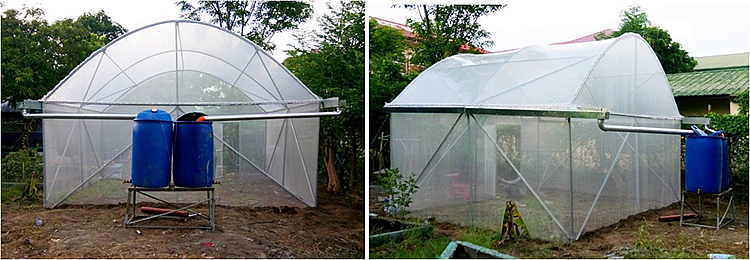 Mini-greenhouse (5m x 4m) serving as seeds/planting materials nursery, with rainwater collection system.
Mini-greenhouse (5m x 4m) serving as seeds/planting materials nursery, with rainwater collection system.
As of 15 May 2016, the significant outputs of the project include the following: six (6) school garden designs for 100 m2 area per school; six (6) action plans for the implementation and maintenance of the school gardens; garden tools, structures, and farm inputs acquired and distributed to the partner schools; and lesson plans being finalized for Grades 4 and 7 integrating nutrition, organic agriculture, and climate change concepts. As part of the action research component of the project, a baseline study on nutrition was conducted wherein the nutritional status of children was assessed, the implementation of the School-based Feeding Program documented, and knowledge/training needs of teachers on anthropometric data collection identified. In addition, Training on Nutrition for the School Gardens Project was conducted to review nutrition concepts, enhance knowledge on calibration and proper use of measuring instruments for weight and height data, and demonstrate traditional cooking of local vegetables. To ensure the successful implementation of the project using the participatory approach, the key players agreed on common logical and conceptual frameworks, and jointly developed the project monitoring and evaluation plans.
The accomplishments and outputs, thus far, have laid the groundwork for the succeeding phases of the project, which are the establishment and maintenance of school gardens, and post-production and value adding activities. In summary, these initiatives are expected to contribute to the following outcomes — improvement in the nutritional condition and dietary habits of school-aged children; and food and nutrition security in the pilot sites in the Philippines.
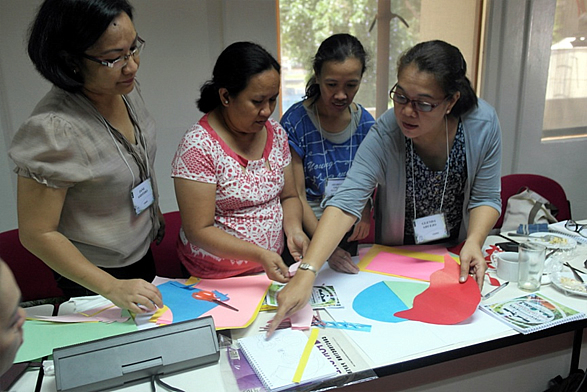 Teachers plan the design of their garden.
Teachers plan the design of their garden.
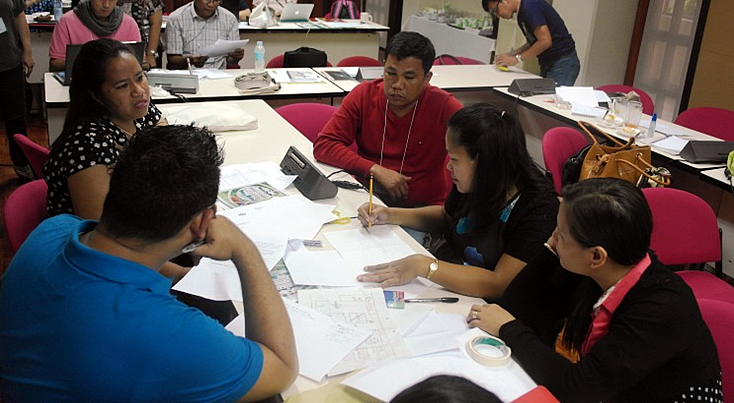 Teachers from Cabuyao Central School work on their action plan.
Teachers from Cabuyao Central School work on their action plan.
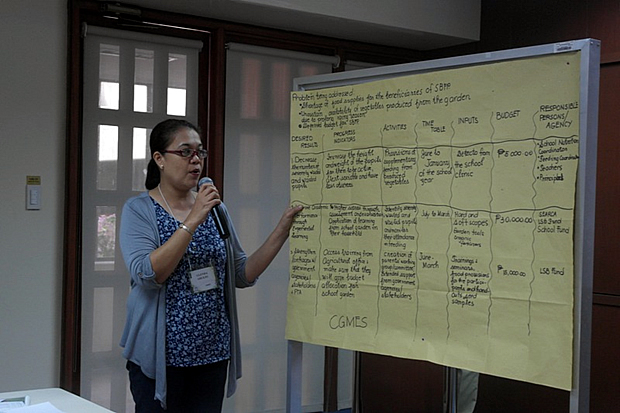 Mrs. Glenda Aruejo (CGMES) presents their Action Plan
Mrs. Glenda Aruejo (CGMES) presents their Action Plan
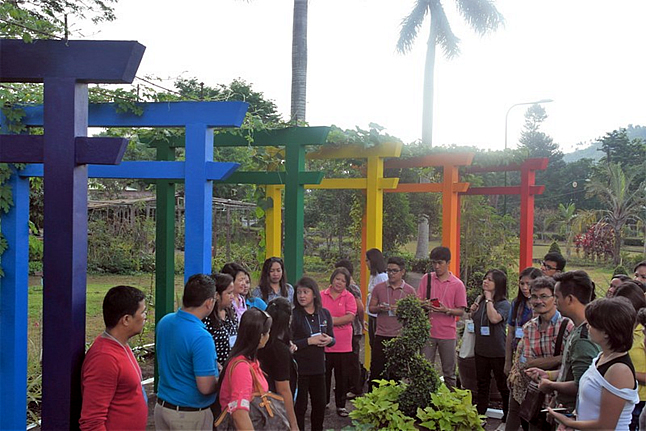 Visit to the UPLB Edible Landscaping Garden
Visit to the UPLB Edible Landscaping Garden
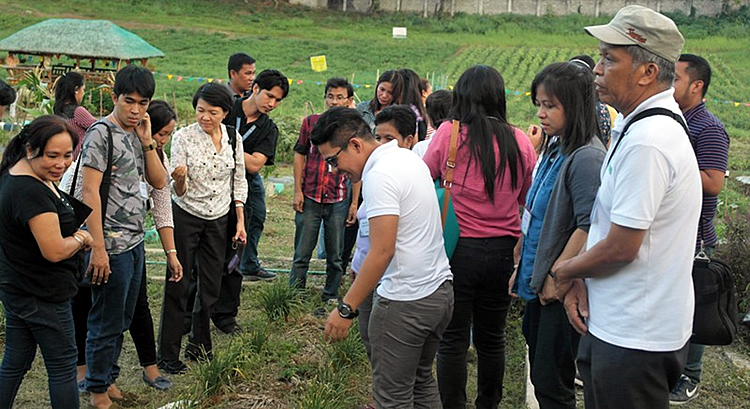 The participants visit the Bureau of Plant Industry’s (BPI) Organic Demo Farm for Organic Seed Production.
The participants visit the Bureau of Plant Industry’s (BPI) Organic Demo Farm for Organic Seed Production.
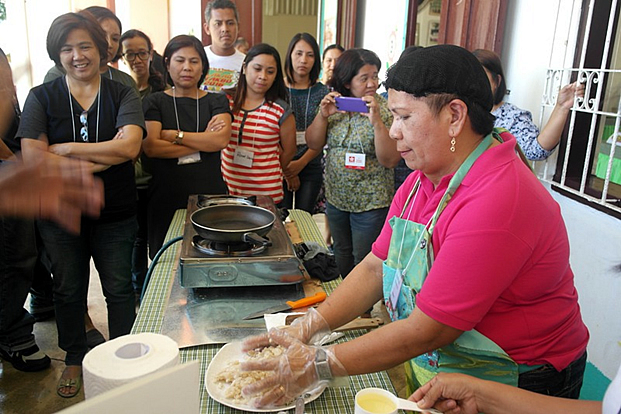 Mrs. Morales demonstrates how to cook the inner core of banana.
Mrs. Morales demonstrates how to cook the inner core of banana.
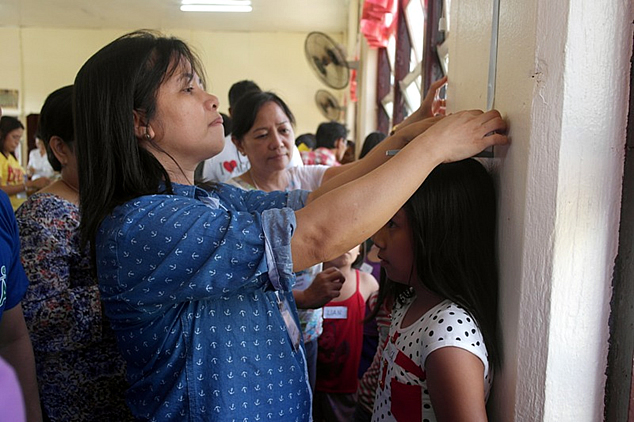 Standardization exercise for height measurement of children.
Standardization exercise for height measurement of children.
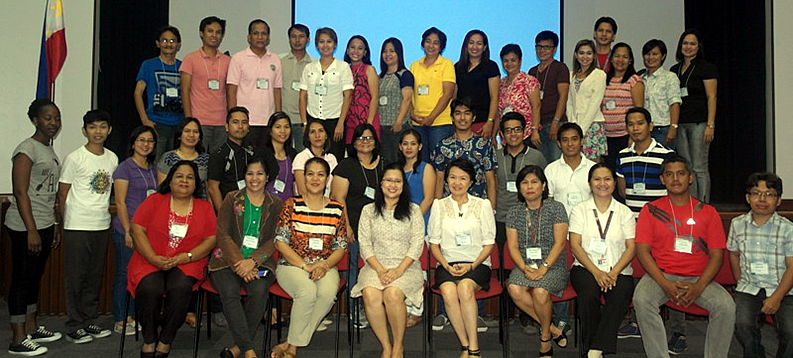 Participants of the writeshop with DepEd and Project Management Team.
Participants of the writeshop with DepEd and Project Management Team.









